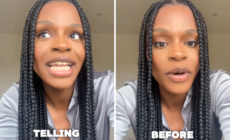-
Couple Renovate ‘Fixer-Upper’ House—Then They Realize What Was in the Walls - 8 mins ago
-
Hardcore birders and casual sparrow spotters: Science needs you - 30 mins ago
-
Steve Bannon’s Battle for the Soul of MAGA - 35 mins ago
-
Iran Suspect Preparing for Terror Attacks on Jews: Prosecutors - 43 mins ago
-
Owner Takes Dog To Say Goodbye to Little Sister, Reaction Breaks His Heart - about 1 hour ago
-
My First America - about 1 hour ago
-
Toddler Realizes She’s Black After Going to Daycare, Mom Has Perfect Response - 2 hours ago
-
Trump May Get His ‘Big Beautiful Bill,’ but the G.O.P. Will Pay a Price - 2 hours ago
-
Donald Trump Perfume Goes on Sale: Here’s What It Smells Like - 2 hours ago
-
BP, Once a Hunter in the Oil Industry, Is Now Prey. What Went Wrong? - 3 hours ago
Legal Issues Will Follow Trump Into Office, With New York Sentencing Set
As President-elect Donald J. Trump prepares for his inauguration, some of the legal cases that spilled out of Mr. Trump’s first presidency will follow him into the second.
Mr. Trump has signaled he plans to fight to postpone the scheduled sentencing for his criminal conviction, set by Justice Juan M. Merchan of the New York Supreme Court for Friday. In social media posts this weekend, Mr. Trump railed against the justice, saying that he should be disbarred.
Justice Merchan made clear that even if the sentencing were to go forward, he would not recommend any kind of prison sentence or home confinement. In announcing the sentencing date, the judge signaled he planned to give Mr. Trump an unconditional discharge in the case, allowing him to walk free but leaving him with a criminal record.
In May, Mr. Trump was convicted of 34 felony counts of falsifying business records in connection with a 2016 election-year hush-money payment to a porn actress who said she had a sexual liaison with him.
But even absent any real penalties, the jury verdict is its own form of punishment for Mr. Trump, a measure of accountability that he remains eager to erase. An unconditional discharge — absent a higher court ruling throwing out the jury verdict — would still formally mark Mr. Trump as a felon, the first president to carry that status into office.
Asked about the cases continuing on during the presidency, Mr. Trump’s communications director, Steven Cheung, said in a statement that the public had given Mr. Trump a “mandate” that “demands an immediate end to the political weaponization of our justice system and all of the witch hunts across the board.”
In setting the sentencing date and dismissing Mr. Trump’s request to toss the verdict, Justice Merchan was unmoved by Mr. Trump’s arguments, including a claim of presidential immunity.
“Defendant argues that a dismissal will ‘improve public confidence’ in the criminal justice system because anything short of a full dismissal will interfere with the presidency,” Justice Merchan wrote. “This court’s perspective is different.”
The justice wrote that setting aside the jury verdict “would not serve the concerns set forth by the Supreme Court in its handful of cases addressing presidential immunity nor would it serve the rule of law.” Instead, he wrote, it would “undermine the rule of law in immeasurable ways.”
Mr. Trump was indicted four times in the span of a few months in 2023, twice on federal charges, once in Fulton County, Ga., and once in New York.
The two federal cases have been withdrawn since Mr. Trump won the election, and the Georgia case has been stalled for months. In December, the Fulton County district attorney, Fani Willis, was removed from the election interference case against Mr. Trump and other defendants, citing her romantic relationship with Nathan Wade, the special prosecutor she chose for the case.
Although the Justice Department’s longstanding policy against prosecuting a sitting president does not apply to state charges, most legal experts say it would be difficult to pursue the case against Mr. Trump in Georgia while he is in office.
But Mr. Trump will most likely continue to face civil proceedings. He recently lost a bid for a new federal trial in a case brought by a New York writer, E. Jean Carroll. That case centered on Ms. Carroll’s claim that Mr. Trump had sexually assaulted her decades ago in a department store dressing room.
The New York attorney general, Letitia James, said that she would not seek to dismiss a separate $486 million civil fraud judgment against him, noting her intention in a letter last month to the Trump lawyer John Sauer, who is the president-elect’s pick for the Justice Department solicitor general.
An appeals court is expected to rule soon on whether to uphold the judgment, which was imposed following a trial in which Mr. Trump was accused of manipulating his net worth and lying about the value of his properties to receive more favorable terms on loans.
There are also eight civil suits accusing Mr. Trump of inciting his supporters to rush the Capitol building on Jan. 6, 2021, while President Biden’s Electoral College win was being certified by a joint session of Congress.
In the New York criminal case, Mr. Trump’s lawyers successfully pushed the sentencing past Election Day. But the Trump legal team — led by Mr. Trump’s choice for deputy attorney general, Todd Blanche, and for principal deputy attorney general, Emil Bove — has argued that the case should be swiftly dismissed, citing the president’s November victory and the broad immunity that the U.S. Supreme Court has granted to presidents for official acts committed while in office.
The inability to overturn the felony conviction remains a source of irritation to Mr. Trump, according to people who have spoken to him about it, even if the case does not appear poised to define the early stages of his second term in the way the Russia investigation did in his first term.






















